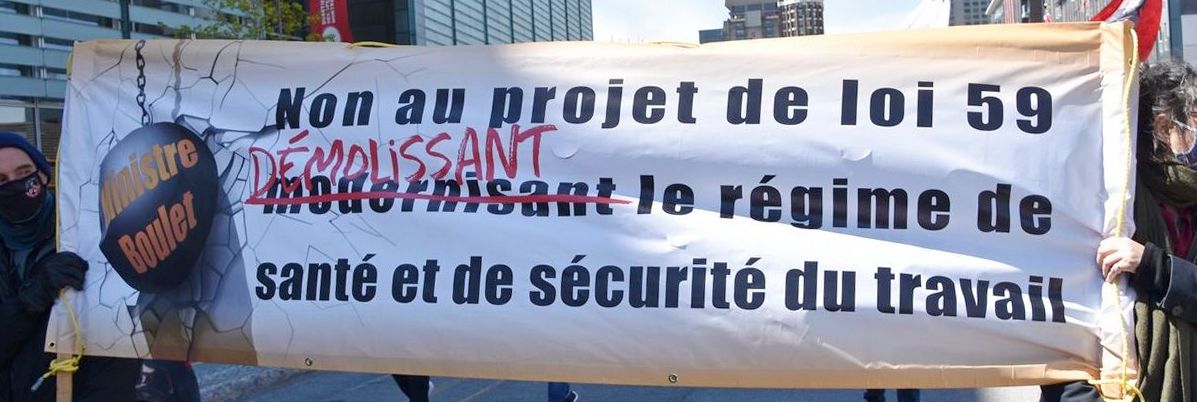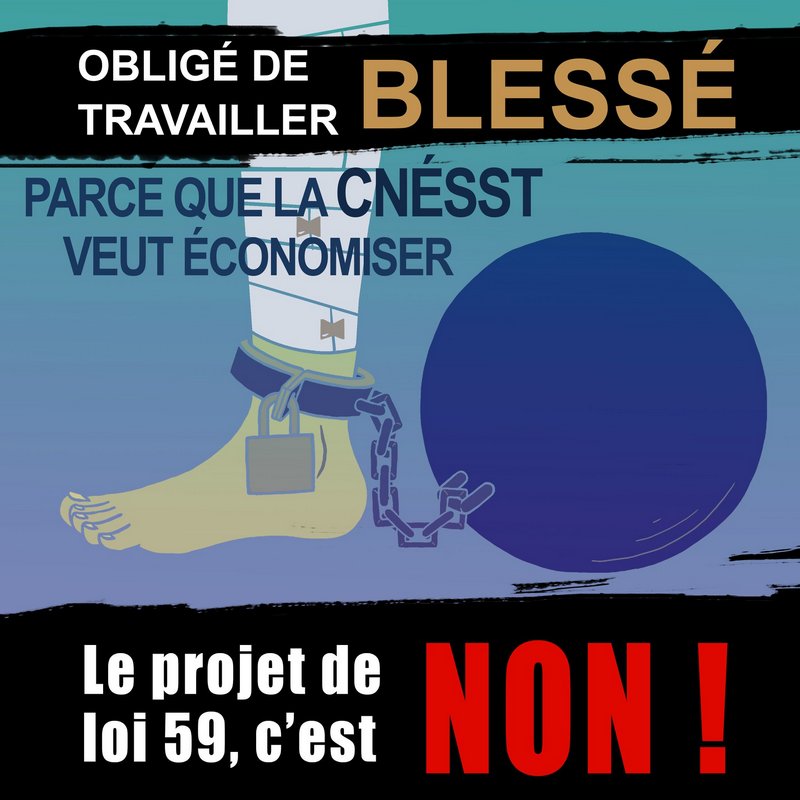 |
||
This "saving" is to be accomplished by a dramatic reduction in access to treatment and compensation for workers injured or made ill on the job. It also gives unilateral power to employers to determine the prevention and health programs, prevention hours, how the joint health and safety committees will operate, and many other aspects of the system. The legislation even permits multi-site programs where an employer can decide that there will be only one prevention representative and one health and safety committee for all its sites in a given region! In their fierce competition for profit and domination, monopolies introduce production processes that are increasingly dangerous. For example, as new technology permits mining at greater depths the danger to workers from rockbursts increases. Remote operation from far away from the actual mine site also increases the danger to the workers. In response to employers' demands, the government is deregulating and dismantling the protection regime, which decreases protection for both workers and communities. We have seen the tragic consequences of the deregulation of the rail industry and degradation of safety procedures, including the Lac-Mégantic disaster. The rail companies and governments have shed some tears but no changes are made and the tragedies continue. The fact that cabinet ministers, whose living and working conditions have nothing to do with those of workers, are proposing a bill that undermines workers' safety and denies workers any say in determining their health and safety conditions, highlights that these governments must be held to account and that the independent voice of workers must prevail as a matter of urgency.
The renewal of the occupational health and safety system must be based on the demands that workers and their organizations put forward. Concerns of the owners of the mines, mills, factories and all other facilities which denigrate the human factor and want the state to only recognize their demands for higher profits, must not be permitted to decide changes to health and safety laws and regulations. The workers are speaking out against this because it is unconscionable and against the social solidarity which lies at the base of Quebec society and imbues their moral compass. Workers' Forum will continue to be part of their important initiatives to make their voices heard. (Photos and graphics: WF, UTTAM, FTQ) Bill 59 Means Reduced Compensation and Increased Impoverishment for Injured and Sick WorkersWorkers' Forum is publishing an interview with Félix Lapan,
community organizer with the Union des travailleuses et travailleurs
accidentés ou malades (UTTAM), on the Quebec government's Bill 59. Workers' Forum: What will be the consequences of Bill 59, if it is adopted, on compensation for injured and sick workers, many of whom live in poverty now? Félix Lapan: To give you an example, the bill changes the definition of suitable employment. Suitable employment is determined by the Labour Standards, Pay Equity and Workplace Health and Safety Board (CNESST) when someone [due to injury or illness] can no longer return to his or her job or hold an equivalent job with his or her employer. It is a job that the CNESST determines that the worker will be able to do. The definition has been changed to make it more difficult for a worker to launch a court challenge to a decision made by the CNESST that a job is suitable. Under this change, decision-makers will only have to consider the essential and characteristic tasks of the job deemed suitable and not, as is now the case, secondary or incidental tasks that are also part of the job and may require physical efforts that workers are not able to perform.
It is important to understand that when workers fail in their appeal to the court, they often end up on social assistance. The bill also includes changes to the medical assessment process. These are changes to how the Medical Evaluation Board (BEM) will process cases.[1] The purpose of these changes is to speed up the process of closing the worker's medical file. The bill authorizes the BEM physician to make unilateral decisions. The worker's physician could say that the injury is not consolidated [this refers to the healing or stabilization of a workplace injury following which no improvement of the state of health of the injured worker is foreseeable -- WF Ed. Note] or that the worker's condition would improve with further treatment, and the employer's designated physician could say the same thing. But the BEM physician could say that the worker must go back to work. In that case, the CNESST stops paying benefits. If the person is not really able to do his or her job, this often has drastic consequences. Such tragic consequences will get even worse if the bill is adopted. The bill also gives coercive powers to the CNESST in vocational rehabilitation. From now on, the CNESST will impose job search support requirements. It is being given regulatory power to say that you must do five or 10 job searches in a week or you will be cut off. Currently, someone who can no longer return to their job because of an injury is entitled to one year of compensation to find a new job. In fact, since the CNESST almost never pays for training, many workers use that year to take courses and access rehabilitation services. This will no longer be possible because CNESST will force the worker to go to a job search assistance agency or guidance counsellors who are subcontracted by the CNESST.
WF: What will be the consequence in terms of poverty for injured or sick workers? FL: The current system, because of its complexities and because it encourages employer challenges and CNESST challenges to the worker's treating physician, is already driving many people into poverty every year. These are people who were once working, who were capable of working, and who have suffered an injury as a result of which they have lost their ability to work, their job and their income. Because of all sorts of pitfalls, they end up on social assistance or surviving on a Quebec Pension Plan disability pension. We are already seeing this. This reform will impoverish many more people. The bill has just added a bunch of pitfalls, obstacles to what is already complex. More people will be thrown out of the system. When the minister talks about the "savings" that will be made with this bill, more than $4.3 billion over ten years, he is not talking about savings for the Quebec government. He is talking about savings for the employer. The regime is 100 per cent funded by employers. It is a system that stems from civil liability. Workers do not have the right to sue their employers in civil court. Instead, they file claims through the CNESST. And CNESST is 100 per cent funded by employers and operates as insurance for employers in a no-fault system. Regarding all the costs that will no longer be paid by the system, the first victims will be injured workers who will lose medical treatment and compensation benefits. The consequences of the $4.3 billion that will be "saved" will be borne by the victims of occupational injuries, by their families and by society as a whole, because the victims will increasingly have to rely on social assistance, employment insurance, the Quebec pension plan and the public health system for costs that the CNESST will no longer cover. This bill is a huge step backwards. It attacks rights that have been established for 35-40 years and it does so in the middle of a pandemic, when people are focused on fighting the pandemic. We will fight this reform to the end. Note1. The Medical
Evaluation Board (BEM) was created in 1992 as part of legislation that
amended the Act respecting industrial accidents and occupational
diseases, among others. The BEM is under the responsibility of the
Ministry of Labour, Employment and Social Solidarity. Its official mandate is to make a final decision when there are two
contradictory opinions, i.e. the opinion of the worker's attending
physician and a medical opinion obtained by the employer or by the
CNESST. The workers have waged relentless actions against the BEM,
which regularly rules unfairly in favour of the employer or the CNESST
against the worker and his or her attending physician. In their
actions,
the workers say that "you go into the BEM, you are crippled. You come
out of there cured. It's a miracle." Injured workers and their advocacy
organizations are demanding the abolition of the BEM. (Translated from original French by Workers' Forum.) (To access articles individually click on the black headline.) Website: www.cpcml.ca Email: office@cpcml.ca |




 In addition, with the limited vocational rehabilitation that CNESST
provides, workers may not be able to find these suitable jobs, may not
be hired because they are competing with workers who have not been
injured,
who do not suffer long-term effects of an injury, who are in good
health. As a result many workers, in order to protect
themselves, challenge the decisions of the CNESST on the suitability of
a job, and ask to have appropriate training to be able to do a job.
Currently the court often overturns the decisions of the CNESST about
what is suitable employment because vocational rehabilitation is so
rushed by CNESST. Instead of improving the vocational
rehabilitation services of the CNESST, the proposed changes to the
definition of suitable employment will allow the courts to stop
overturning the CNESST's decisions on what constitutes suitable
employment.
In addition, with the limited vocational rehabilitation that CNESST
provides, workers may not be able to find these suitable jobs, may not
be hired because they are competing with workers who have not been
injured,
who do not suffer long-term effects of an injury, who are in good
health. As a result many workers, in order to protect
themselves, challenge the decisions of the CNESST on the suitability of
a job, and ask to have appropriate training to be able to do a job.
Currently the court often overturns the decisions of the CNESST about
what is suitable employment because vocational rehabilitation is so
rushed by CNESST. Instead of improving the vocational
rehabilitation services of the CNESST, the proposed changes to the
definition of suitable employment will allow the courts to stop
overturning the CNESST's decisions on what constitutes suitable
employment. So
we are faced with a general increase in the complexity of the claims
mechanism and the challenge process that is truly mind-boggling. Even
for those of us who work on these issues all the time, it took us a
while to understand these changes. I can't see how a worker who
doesn't know the law is going to understand when to make a
claim for an occupational disease, how much time they have, etc. It's
really twisted and complex.
So
we are faced with a general increase in the complexity of the claims
mechanism and the challenge process that is truly mind-boggling. Even
for those of us who work on these issues all the time, it took us a
while to understand these changes. I can't see how a worker who
doesn't know the law is going to understand when to make a
claim for an occupational disease, how much time they have, etc. It's
really twisted and complex.